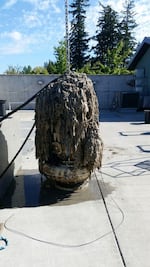One of Oregon’s most populous counties is seeing a significant increase in non-flushable items clogging pipes during the coronavirus pandemic, which can severely damage the sewage system and create wastewater overflows.
Since March 17, Washington County Clean Water Services has seen more non-flushable items like cleaning wipes, facial tissues, napkins, mop refills, rags, and feminine hygiene products clogging pipes at their pump stations. What used to be a once-a-year cleanup to unclog pipes now has been happening on a weekly basis.
Clean Water Services’ Karen DeBaker said clogged pipes have always been a problem, but right now it is on overdrive.

Washington County's Clean Water Services is seeing a 40% increase in additional work to unclog pump station pipes due to COVID-19.
Clean Water Services
“With the unprecedented event of COVID-19, we are seeing an increase in what we call non-woven products and these products do not break down, DeBaker said.
There are 39 pump stations spread throughout the county and at least 5 stations are now requiring more work to unclog the pipes.
This could cause a public health problem as wastewater can overflow back up into homes or storm drains.
“We need that used water, that wastewater to be carried away so it can get to the treatment facility so it can be cleaned, returned, released back into the river in order to be used again,” DeBaker said. “At a time when we are asking folks to wash their hands and clean up and use more water, we need to keep these critical services going.”
DeBaker thinks one of the issues that might be contributing to the increase of non-flushable items is the shortage of toilet paper, as panic buying during the pandemic has left many searching or using other options for toilet paper.
“We’re seeing the decrease in availability of toilet paper and people are saying ‘I can just look and pull this other thing that’s paper and I’ll use that instead’ and what happens is again, they’re not made to be flushed they don’t dissolve like toilet papers,” DeBaker said.
The “out of sight and out of mind” mentality may also play a role. Debaker said if even one person is flushing these items in their neighborhood, it could clog up the pipes for everyone.
Clean Water Services said its water professionals are working around the clock to keep used water flowing from homes and hospitals during the pandemic to reduce the potential of wastewater coming back up.
In Multnomah County, Bureau of Environmental Services Public Information Officer Diane Dulken said non-flushable items clogging pipes pose a continuous issue but Portland has not seen an increase in clogged pipes since the pandemic and the resulting toilet-paper shortages.
“There is a baseline where we do have certain pump stations where we do have problems and we work with either the entities that we know to try and address those issues, but by and large we are not seeing an increase because of COVID,” Dulken said.
In Salem, the Public Works Department has seen an increase in the number of wipes being flushed but there has not been an increase in clogged pipes.
